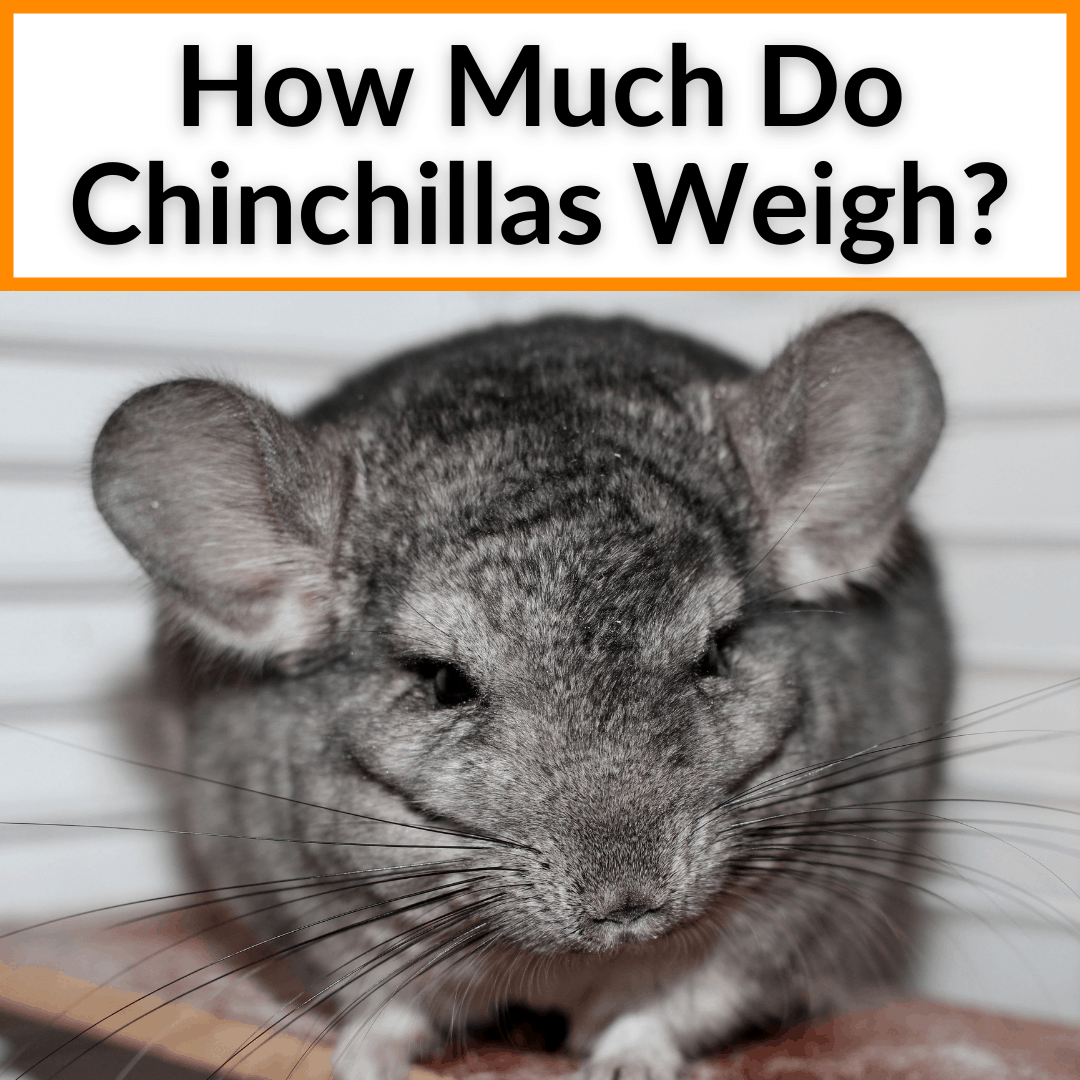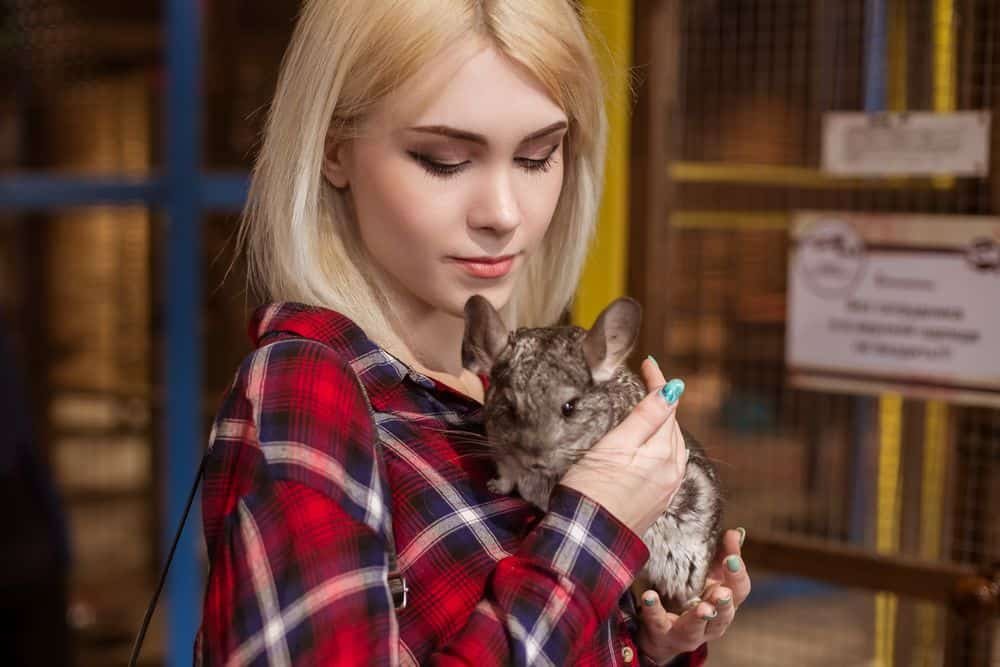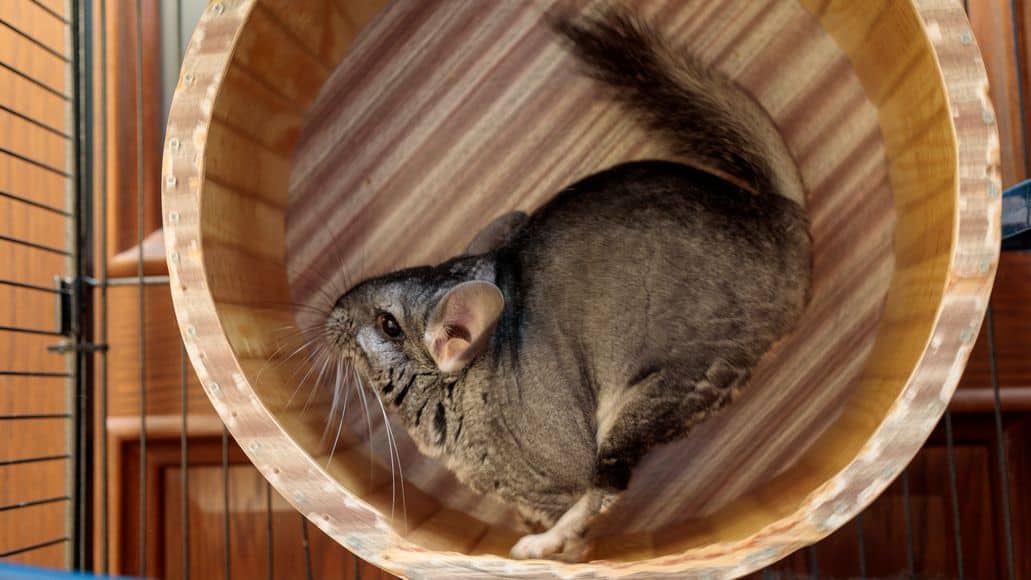
If so, you’re being a bit unfair.
All chinchillas look chubby!
It’s one of the things that makes them so endearing.
But it is important to know what a healthy weight is for your chinchilla. That way you can ensure he or she is neither overnourished nor undernourished.
Keep reading to learn how much chinchillas weigh when they are healthy, plus tips on monitoring their weight and keeping them at the ideal weight.
Contents
How Much Do Chinchillas Weigh?
Chinchillas weigh between 400 and 600 grams. This equals 14 to 21 ounces.
A mature, healthy chinchilla will weigh closer to the upper limit of the range. Chinchillas should not exceed 600 to 700 grams to remain at a healthy weight and in optimal health.
These are the ideal weights you should be striving for with your chinchilla. It’s easy to maintain these weights, if you don’t overdo certain things and keep your chinchilla on a healthy diet.
We’ll cover the best practices below, to help you ensure your chinchilla remains in this ideal range and lives a long and healthy life.
Weigh Your Chinchilla

This may come as a big shock to you, and I know that many chinchilla owners don’t do this, but the best practice is actually to weigh your chinchilla on a weekly or monthly basis.
Chinchillas are a small rodent with incredibly dense fur. As a result, it’s sometimes hard to notice when a change in weight occurs.
Weighing your chinchilla regularly allows you to track changes much more easily.
And it is easy to do. Simply buy a cheap scale and perform a weight check during the time out of the cage.
If your chinchilla isn’t a huge fan of being held, you may have to get more creative with this process.
Overall, it doesn’t take long for your chinchilla to get warmed up to you, and you likely won’t have any issues with this task.
This is a simple precautionary step you can take to ensure your chinchilla is eating correctly and gaining weight aa it should.
This is especially important if you have a newborn chin that needs more care and tracking to ensure it is progressing healthily.
Again, I’m aware that many chinchilla owners don’t currently do this, but if you want to worry a bit less about your chinchilla, this is an excellent way to stay on top of things.
Stick To The Correct Diet
This is as easy as it can get. Having your chinchilla stick to the correct diet will ensure it remains at the proper weight.
If you are unsure what foods your chinchilla should be eating, you can start by reading my full guide on what chinchillas can eat here. It will give you a full breakdown.
Basically, you need to offer your chinchilla specially formulated pellets and timothy hay as their two primary food sources.
Not allowing your chinchilla to eat treats, or foods in general, that are high in sugar is one of the most critical factors.
This advice alone is going to help you dramatically in keeping your chinchilla at an ideal and healthy weight.
Don’t Go Overboard With Treats
While this may sound easy, it’s likely one of the most challenging things you can do.
Given how affectionate a chinchilla can be towards you, it’s tough not to give in and offer rewards more than we should. But you need to be aware that doing so is dangerous to your chinchilla’s health.
I read a lot of forums and articles where chinchilla owners get a bit crazy with treats, especially in the form of fruit. The sad truth is that not all the treats are even considered safe for chinchillas.
I have an entire post about what fruits a chinchilla can eat and which they can’t.
I believed this was an important and crucial topic to discuss, and I think that this post may be able to help you greatly towards your chinchilla living healthily and staying at the correct weight.
Understand What Treats To Offer Your Chinchilla
I already briefly touched on this, but some chinchilla owners offer their furry friends more than just the fruits we mentioned before.
I recommend always learning from a reputable source, or even speaking to a vet, if you believe a treat may not be safe, or if your chinchilla may be showing signs of weight issues.
I personally am not a huge fan of offering my chinchilla too many treats and try to stick to only chinchilla formulated pellets, timothy hay, and chew sticks.
Outside of this, I may offer my chinchilla oats occasionally. But nothing else, really.
I haven’t encountered an issue thus far with any illnesses, nor had any problems with my chinchilla’s weight, so I think this is the most straightforward way to ensure your chinchilla maintains a healthy weight and stays free from digestive, stomach, or other health concerns.
Ensure Your Chinchilla Is Active

Staying active keeps us all in shape and our weight in check, right? Well, the same is true for your chinchilla.
I think you know, if you follow my blog at all, that I always recommend an adequately sized chinchilla cage.
If you weren’t aware of this, read my post about the proper size of chinchilla cages here.
It’s imperative that your chinchillas can act like chinchillas. This involves running around as well as getting crazy jumping from shelf to shelf.
Not only that but chinchillas love to climb and interact inside of their environments. A big cage with multiple levels can help your chinchilla stay active, healthy, and happy.
With space in the cage to be active, your chinchilla should be able to stay at a healthy weight and keep its body at peak performance.
While the cage size is important, it is equally vital to get your chinchilla out of the cage at least once per day, so it can run around and burn off some energy.
This is another way to keep your chinchilla mentally stimulated and active, and it goes a long way toward keeping its weight in check.
It’s like all other animals, and even us as humans. We consume calories, but the more activity and the more we do in general helps to burn some of that weight and keep us stronger and healthier.
Contact Your Vet If You Sense A Problem
Now, let’s assume that you have done everything correctly. Let’s also assume you aren’t overdoing it with the treat, you’re giving your pet plenty of opportunity to exercise and are doing everything else we advise.
If your chinchilla still appears to be gaining weight or something seems off in general, you need to recognize when it’s time to call a vet for help.
Additionally, it’s imperative that you are working with a vet that knows and understands chinchillas.
While chinchillas are relatively popular pets and wonderful pets to own, not all vets are knowledgeable about how to help and treat a chinchilla.
Do your homework and diligence ahead of time, so you aren’t stuck in a pickle when something does go wrong.
Long story short, you need to be aware when you can’t help or remedy the problem, bust out the wallet, and be prepared to head into your local vet.
Doing so is the best way to ensure your chinchilla remains safe and healthy. And always remember that your chinchilla’s weight is an integral part of its health, just as it is with other animals, and us humans.
How Much Chinchillas Weigh: Final Thoughts
While this post may have scared you a bit concerning the challenges that could arise owning a chinchilla, it really shouldn’t have.
It’s straightforward to keep your chinchilla healthy and happy.
Refrain from too many treats and be sure only to feed your chinchilla food that’s deemed safe. Additionally, always be alert and understand when it’s time to let a professional help you.
A chinchilla’s weight is something you need to keep tabs on, but nothing to get overly anxious about. Most chinchilla owners will never have an issue with this.
If you do, I hope this post helped. Chili and I wish you the best of luck with your new chinchilla and the journey you have ahead of you.
Share your thoughts and concerns about a chinchilla’s weight.
As always, I encourage all your feedback on this topic as well. Be sure to share those thoughts, stories, and concerns by dropping a comment below.
As always, Chili and I appreciate you stopping by and reading today and we will see you again next time.

Leave a Reply